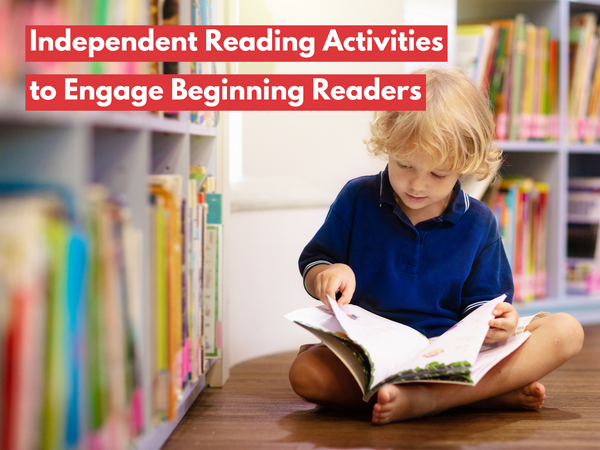
Last week, we had a series of posts on the role of parental involvement in children's literacy , presenting ideas for Family Literacy Workshop activities, taken from Family Literacy Workshops for Preschool through Grade 6: A Research Based Approach . You can see those earlier posts here.
Due to the popularity of the subject, we've decided to keep the subject a recurring topic here on our blog, with a new post every week or so offering new free activity downloads and further instruction on how to hold successful family literacy workshops at your school. Most Tuesdays for the next few months, you can check back here and find this kind of content.
In today's post, we will look at difficulties encountered in family literacy, and provide the first part of the agenda for Workshop 2, which will help parents understand how children begin learning to read. It will also teach parents how to read aloud effectively with their children at home. You can download the in-workshop activity, complete with transparencies, at the bottom of the page.
From Family Literacy Workshops for Preschool through Grade 6: A Research Based Approach:
Hard Realities
Reading is the criterion used by politicians, and the public in general, to determine the success or failure of a school. Regardless of the background or circumstances of our students, schools are expected to ensure that each child has proficient, on grade level, reading and writing skills. More than just a political slogan, it has become the daily reality in our schools. If children fail, our school is a failure and so are we. We will not have the luxury of being measured by how hard we work on behalf of our students, but rather on the specific outcomes of that work. Given this daunting task, we will need the support of everyone to accomplish this goal.
We talk about the importance of family support, but in reality do very little about it.
That family support of school generally, and learning to read specifically, is critical, is a universally held opinion. We know that support from the family is an important part of each child’s achievement in school. All parents want their children to be successful in school. All parents know that reading, and to a lesser extent writing, is part of that success. Many parents try to help their children and support the work that is being done in school. Most parents would do more if they had a better understanding of the importance of their role and the kinds of things that they could do that would be helpful.
Our Survey of Teachers and Principals
Much of what we hear from teachers and principals about family support is not positive.
During the numerous Family Literacy Workshops that led to the development of this book, we asked teachers and principals, “What two things would you change about how parents support the school?” These are some of the more common responses.
General Comments
 Communicate to their children the value of education.
Communicate to their children the value of education.
Parents shouldn’t tell their children that they didn’t do well in school but came out all right anyway.
Teach children to respect their teachers.
- Parents speak volumes to their children when they criticize school and the teachers themselves.
Have reasonable expectations of the role of the school.
- Many parents act as though the school is a day care center, health clinic, and restaurant all rolled into one.
Support children with their homework, but don’t do it for them.
- Many parents think homework demonstrates the rigor of a school and then use it as a way to make their child look good.
 Children and school need to be a higher priority in many families.
Children and school need to be a higher priority in many families.
We have parents who can’t manage to get out of bed to make sure their children get to school on time.
Many parents ignore homework and school events entirely.
Participate in school activities.
- There are parents whose support is welcomed and others we would just as soon stay home.
- Involving parents is just too much work for what you get.
Comments Related to Literacy
Make reading an important part of their family life by reading themselves and reading with their children.
- We have children whose only exposure to books is in school.
Parents need to communicate more with their children.
- Families where children are to be seen and not heard miss important opportunities to develop oral vocabulary.
Looking at the Whole Child
It is, unfortunately, still common to hear teachers blame children and their families for their failings or low achievement. Many will say that their lack of performance can be attributed to the family and that these conditions are not under their direct control and therefore not their responsibility. Imagine a physician who believes that his work is only contained within the four walls of his office or in a hospital. Whatever happens outside of this area is neither his concern nor something he can influence. This is, of course, an unacceptable view of the work of physicians and one that would not be tolerated. We expect them to take into consideration all of the variables that might affect the health of a patient and develop a plan that addresses all of the conditions that might affect the outcome. The result is treatment that includes medication taken at home, diet, exercise, and a wide range of lifestyle issues. In other words, everything that might impact the result is taken into consideration in the treatment.
This medical model needs serious consideration by schools. Likewise, schools and teachers should consider all of the variables and develop a plan to address each issue as it affects student learning. If children are hungry, we feed them. If they are ill, we arrange treatment. If the level of language stimulation in the home is low, we increase our efforts in school. If there are no reading materials at home, we send books home.
Even with these kinds of school efforts, family involvement in the schooling process is important to the success of each individual child. It is the responsibility of schools to encourage this involvement, but it is necessary that the role of the school be even more proactive. It is a professional obligation to ensure that families are able to participate in the educational experience of their children. Lack of family engagement is an explanation not an excuse. If family involvement is important, and it is generally agreed that it is, then the support needed for children to be successful becomes the responsibility of the school.
Schools must engage directly in training families to provide the necessary support to maximize the school experience of their children.
On the Brighter Side
Though the value and impact of No Child Left Behind (NCLB) have played to decidedly mixed reviews, there is no argument that this law has changed the face of public education. One of the more positive aspects of this law, and one supported by this book, is the recognition of the importance of parental involvement. As part of its implementation, all schools and districts are required to provide information about effective parent-involvement practices and even further, schools that receive Title I funds are required to have a written parent-involvement policy and spend at least one percent of their money on ensuring their involvement. Should a school be identified as needing improvement, they are required to include parent involvement strategies in their school improvement plan. All of these regulations carry with them the positive perspective that parent involvement is important and can support the school improvement process.
Under NCLB, all schools and districts are required to provide information about effective parent-involvement practices.
Reading Aloud to Children
Reading aloud to children is one of the most beneficial activities parents can do with their children. Regardless of age, children benefit from hearing and using vocabulary that comes from books. Reading aloud allows parents to model sophisticated language and fluent reading. Text features and problem-solving skills commonly used in reading can also be demonstrated for children during a read aloud.
Here are the first three items that should be on the agenda for this workshop:
1) Welcome and review of the activities from the previous workshop.
Welcome parents back and remind them of the importance of their continued participation. Welcome new parents to the group. As a group, discuss some of the successes and difficulties parents experienced since the last workshop. Ask them to share some of their completed take-home activities.
2) Review the theme and the objectives of the workshop.
Share with parents the importance of reading aloud to their children at home. During this discussion, remind parents that the language used for everyday conversations is not the same as language found in books. When parents read aloud, they are modeling academic language and exposing children to the types of vocabulary and text structures they will see and hear at school. This workshop will also help illustrate for parents the process that their children go through when learning to read.
3) Workshop activity — Understanding the Reading Process
This activity will help parents understand some of the strategies children use when they learn to read. Though this is a challenging activity, many teachers have found this simulation to be an effective way for parents to think about what their children are trying to do when they read. Full instructions and reproducibles for this workshop activity are downloadable below.







